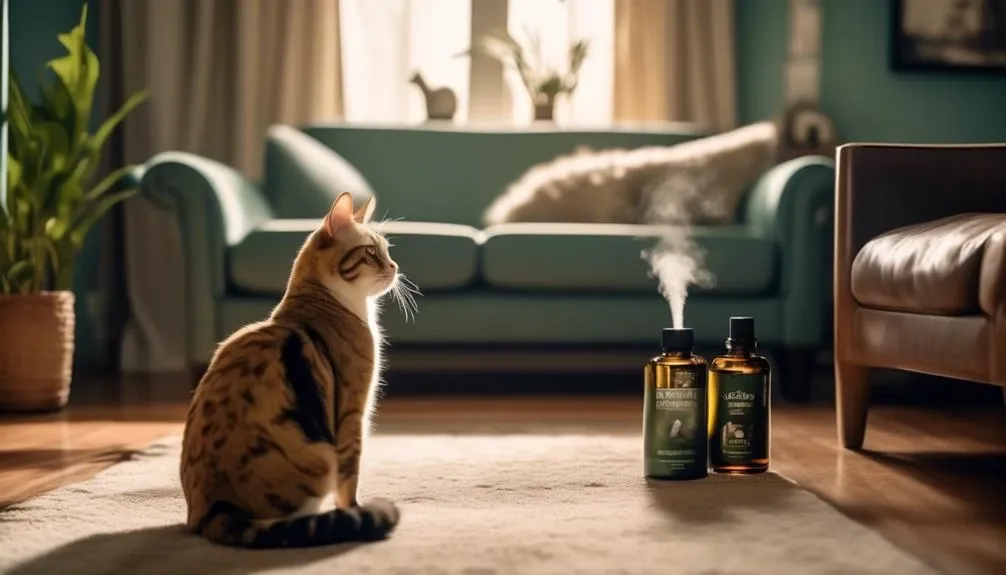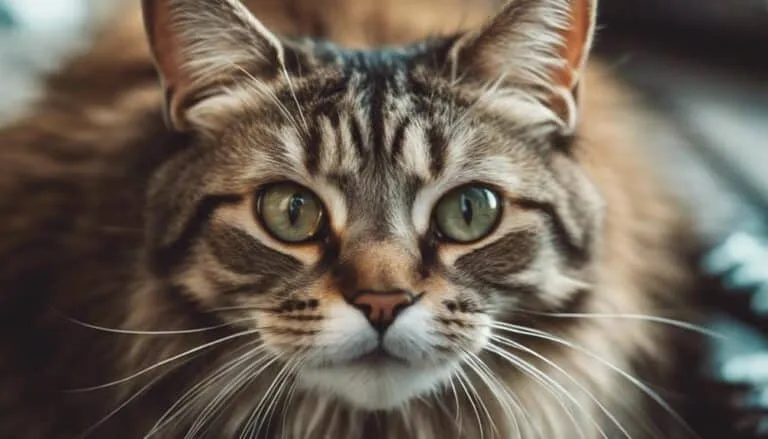The Best Fluffy Pancakes recipe you will fall in love with. Full of tips and tricks to help you make the best pancakes.

Tea tree oil, a popular natural remedy known for its medicinal properties, has gained recognition for its effectiveness in treating various conditions. However, while it may be beneficial for humans, it poses a deadly threat to our feline companions.
The toxicity of tea tree oil to cats cannot be overstated, as even small amounts can have fatal consequences. In this discussion, we will explore the dangers of tea tree oil poisoning in cats, including its signs, effects, and potential treatment options.
Furthermore, we will shed light on safer alternatives for cat wound care and the potential risks of using tea tree oil as a cat repellent. Stay tuned to discover the crucial information you need to ensure the well-being of your beloved feline friends.
Key Takeaways
- Tea tree oil is toxic to cats and should never be used on them.
- Cats can be exposed to tea tree oil through their skin or by ingesting it while grooming themselves.
- Even small amounts of tea tree oil can be fatal to cats, especially in high concentrations.
- There is no antidote for tea tree oil poisoning in cats, and veterinary treatment is necessary for their chances of survival.
Tea Tree Oil: History and Uses
Tea Tree oil, derived from the Australian tea tree, has a long history of use for its medicinal properties and has been utilized by various cultures for centuries. The history of tea tree oil dates back to the indigenous people of Australia, who used it for its antiseptic and healing properties.
Today, tea tree oil is widely recognized for its benefits in treating a variety of conditions in humans and pets. It is known for its antimicrobial, anti-inflammatory, and antifungal properties, making it an effective treatment for acne, fungal infections, and even dandruff. However, it is important to note that tea tree oil should only be used topically and never ingested, as it can be toxic.
Additionally, while tea tree oil has benefits for humans, it is toxic to pets, especially cats, and should never be used on them.
Toxicity of Tea Tree Oil to Cats
The toxicity of tea tree oil to cats is a significant concern due to its potential to cause severe harm and even death in feline companions. Cats are particularly sensitive to the toxic effects of tea tree oil, and even small amounts can be fatal, especially in high concentrations.
The toxin can be absorbed through the cat's skin or ingested when they groom themselves. Cats exposed to tea tree oil may exhibit symptoms such as hypersalivation, weakness, uncoordinated movements, and difficulty walking. Long-term effects of tea tree oil poisoning in cats can include liver failure and death, even in small quantities.
To prevent tea tree oil toxicity, it is best to use cat-friendly antiseptics and shampoos with low concentrations of tea tree oil, if necessary, and always follow label instructions. It is crucial to seek immediate veterinary care if tea tree oil poisoning is suspected in a cat.
Absorption and Ingestion Risks for Cats
Cats face significant risks of absorption and ingestion when exposed to tea tree oil, due to their sensitivity to its toxic effects. Tea tree oil can be absorbed through the skin and ingested when cats lick themselves, making accidental exposure a concern.
To prevent accidental exposure, it is crucial to educate cat owners about the dangers of tea tree oil and the importance of avoiding its use on cats. Cat owners should be informed that even small amounts of tea tree oil can be fatal to their feline companions, especially in high concentrations.
Instead, cat-friendly antiseptics like chlorhexidine and iodine should be used for treating superficial cuts and wounds. Pet shampoos with low concentrations of tea tree oil, less than 1-2%, can be considered safe if used according to label instructions.
Safer Alternatives for Cat Wound Care
Due to the potential risks of tea tree oil to feline health, it is essential to explore safer alternatives for cat wound care.
When it comes to treating cat injuries, there are several natural remedies that can be considered. One alternative is a saline solution, which can be made by mixing salt and water. Saline solution can help cleanse wounds and promote healing.
Another option is aloe vera gel, which has antibacterial and anti-inflammatory properties. It can be applied topically to soothe and heal wounds.
Additionally, calendula cream, derived from marigold flowers, can be used as a natural antiseptic and wound healer.
These alternatives provide safe and effective options for cat wound care, ensuring the well-being and health of our feline companions.
Signs and Effects of Tea Tree Poisoning
Exposure to tea tree oil in cats can lead to a range of signs and effects, indicating the poisoning and potential harm caused by this toxic substance.
Cats are highly susceptible to the toxic effects of tea tree oil, as even small amounts can be fatal, especially in concentrated forms. Symptoms of tea tree poisoning in cats include hypersalivation, weakness, uncoordinated movements, and difficulty walking. Tremors can occur even with low doses of tea tree oil. The liver can be severely affected, leading to liver failure and death.
It is important to note that tea tree oil is toxic to other animals as well. Prevention and education are vital in avoiding tea tree oil poisoning in cats and ensuring the safety of pets.
Tremors and Liver Failure in Cats
Tremors and liver failure are significant consequences that can occur in cats exposed to tea tree oil.
Cats that come into contact with tea tree oil may experience cat tremors, which manifest as uncoordinated movements, weakness, and difficulty walking. These tremors can be induced by even low doses of tea tree oil.
Additionally, the ingestion or absorption of tea tree oil can lead to liver damage and ultimately liver failure in cats. It is important to note that highly concentrated tea tree oil products pose the greatest danger to cats.
In cases of tea tree oil poisoning, there is no specific antidote available. Veterinary treatment and support, including the administration of IV fluids, are vital for eliminating the oil from the cat's body and increasing its chances of survival.
Treatment Options for Tea Tree Oil Poisoning
The treatment of tea tree oil poisoning in cats requires prompt veterinary intervention and supportive care. There is no specific antidote for tea tree oil poisoning, so treatment focuses on eliminating the oil from the cat's body and managing the symptoms.
The veterinarian may induce vomiting or perform gastric lavage to remove any remaining oil from the stomach. Activated charcoal may also be given to adsorb the toxin and prevent its absorption into the bloodstream.
Supportive care includes intravenous fluids to maintain hydration, liver protectants to minimize liver damage, and medications to control any symptoms such as tremors or seizures.
It is crucial to contact a veterinarian immediately if tea tree oil poisoning is suspected. Prevention measures include keeping tea tree oil and other essential oils out of reach of cats, using cat-friendly antiseptics, and avoiding the use of tea tree oil as a cat repellent.
Veterinary Support and Immediate Action
Prompt veterinary support and immediate action are crucial in cases of tea tree oil poisoning in cats. When a cat ingests or is exposed to tea tree oil, it is important to seek veterinary treatment options as soon as possible. The toxic effects of tea tree oil can rapidly progress and lead to severe complications, including liver failure and death. Time is of the essence in these cases, as immediate action can greatly improve the cat's chances of survival.
Veterinarians may employ various treatment strategies, such as inducing vomiting, administering activated charcoal to bind the toxin, and providing intravenous fluids to support hydration and aid in the elimination of the oil from the body. The veterinarian should be informed about the quantity of oil consumed, the symptoms exhibited, and the concentration of the product.
Acting swiftly and seeking professional help is paramount in mitigating the harmful effects of tea tree oil poisoning in cats.
Tea Tree Oil as a Cat Repellent: Potential Dangers
Tea tree oil poses potential dangers when used as a cat repellent due to its toxic nature and harmful effects on cats. Cats are highly sensitive to tea tree oil, and even small amounts can have serious consequences.
When used as a cat repellent, tea tree oil can lead to skin allergies in cats. The oil can cause irritation, redness, itching, and even blistering of the skin. Ingesting or inhaling tea tree oil can also result in respiratory issues in cats. It can cause coughing, wheezing, difficulty breathing, and even pneumonia.
Additionally, cats may groom themselves after coming into contact with tea tree oil, which can lead to ingestion of the oil and further complications.
It is crucial to avoid using tea tree oil as a cat repellent to protect the health and well-being of cats.
Safer Methods to Deter Cats
When seeking alternatives to using tea tree oil as a cat repellent, it is important to prioritize the safety and well-being of cats by exploring safer methods.
There are numerous alternative repellents and natural deterrents that can be used to deter cats from specific areas. One effective method is using citrus peels or citrus-scented sprays as cats generally dislike the strong smell of citrus.
Another option is to use motion-activated sprinklers or ultrasonic devices that emit high-frequency sounds that cats find unpleasant.
Physical barriers such as fences, netting, or prickly plants can also be utilized to keep cats away from certain areas.
Additionally, providing cats with designated scratching posts and toys can redirect their attention and discourage them from entering unwanted spaces.
Conclusion
In conclusion, tea tree oil can be a deadly threat to cats due to its toxic nature. While it has been valued for its medicinal properties in humans, it should never be used on cats as it can be fatal, even in small quantities.
Immediate veterinary assistance is crucial if tea tree oil poisoning is suspected. Safer alternatives should be used for cat wound care, and caution should be exercised when using any essential oils as cat repellents.








